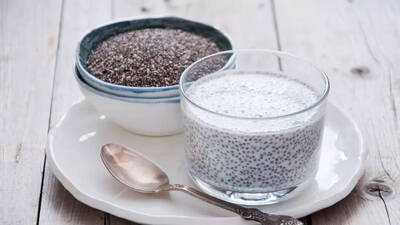
Chia seeds are widely regarded as a superfood, and milk is a nutritious staple rich in calcium and protein. At first glance, combining the two may seem like an ideal health drink that supports digestion, bone strength, and energy levels. However, this mixture is not always safe for everyone. Chia seeds absorb liquid and expand, which can lead to bloating, constipation, or even choking if not soaked properly. Milk, on the other hand, may cause issues for those with lactose intolerance or dairy sensitivity. Together, they can also reduce mineral absorption and, in some cases, trigger allergic reactions .
5 side effects of drinking chia seeds with milk
According to nutrition experts, chia seeds and milk can be safe for most people when consumed properly, but excess intake or poor preparation may trigger health concerns. Below are the key side effects to be aware of:
1. Digestive discomfort and bloating
Chia seeds are extremely high in soluble fibre, which absorbs liquid and swells into a gel-like form. When combined with milk, this can overload the digestive system and cause bloating, gas, cramps, or constipation. A review in
Nutrients confirms that sudden increases in dietary fibre can lead to gastrointestinal discomfort, particularly in people with irritable bowel syndrome (IBS).
2. Choking hazard from swelling seeds
Chia seeds absorb up to 10–12 times their weight in liquid, which can be dangerous if eaten dry and then combined with milk. A case report in
Annals of Allergy, Asthma and Immunology described oesophageal obstruction caused by dry chia seeds expanding after ingestion. Proper soaking is essential to avoid this risk.
3. Lactose intolerance reactions
For people with lactose intolerance, milk already causes diarrhoea, bloating, and cramps, and chia’s fibre can intensify these effects.
The National Institute of Diabetes and Digestive and Kidney Diseases (NIDDK) estimates that around 65% of the global population has some degree of lactose malabsorption, making this combination problematic for many.
4. Reduced nutrient absorption
Chia seeds contain phytic acid, which binds to minerals like calcium and reduces their absorption. An in-vitro study published in
Foods showed that calcium bio accessibility dropped when chia was added during digestion. Excessive intake of milk may therefore reduce long-term calcium uptake.
5. Allergic reactions
Though rare, chia seed allergies can trigger rashes, digestive upset, or breathing difficulties. Milk, being one of the most common allergens, can also cause reactions ranging from mild digestive discomfort to life-threatening responses in individuals with lactose intolerance or a milk protein allergy. A case described in the
Journal of Allergy and Clinical Immunology: In Practice confirmed allergic responses linked to chia consumption, highlighting the need for extra caution.
While chia seeds and milk both provide valuable nutrients, their combination is not risk-free. Drinking chia seeds with milk can lead to digestive discomfort, choking hazards, reduced nutrient absorption, and allergic reactions. Soaking the seeds before adding them to warm milk and consuming in moderation helps minimise risks. A balanced diet remains essential for enjoying the benefits of chia seeds and milk without harmful side effects.
FAQs
Q1. Is it safe to drink chia seeds with warm milk?
Yes, but only if the chia seeds are soaked first. Consuming them dry with milk increases the risk of choking and digestive discomfort.
Q2. Can chia seeds with milk cause constipation?
Yes, overconsumption of chia seeds with milk can cause constipation, especially in people with low water intake or sensitive digestion.
Q3. Who should avoid chia seeds with milk?
Individuals with lactose intolerance, dairy allergies, swallowing difficulties, or seed allergies should avoid or limit this combination.
Disclaimer: This article is for informational purposes only and does not constitute medical advice. Always consult a qualified healthcare professional before making any changes to your health routine or treatment.
Also read |
Turmeric water in the morning can cause blood thinning and liver issues; know side effects
-
Narendra Modi’s eco-friendly vision: Driving solar power, cleanliness & sustainability

-
Not only the elderly, diabetes is being engulfed, control these 10 ways without medicine

-
Exosomes (whether lab-crafted or plant-extracted) are skin care’s latest trend

-
The relationship between these 2 people’s nominees is exciting, adopt each other’s merits and flaws

-
40,000 teachers bat, Bihar Education Department gave this big gift!
